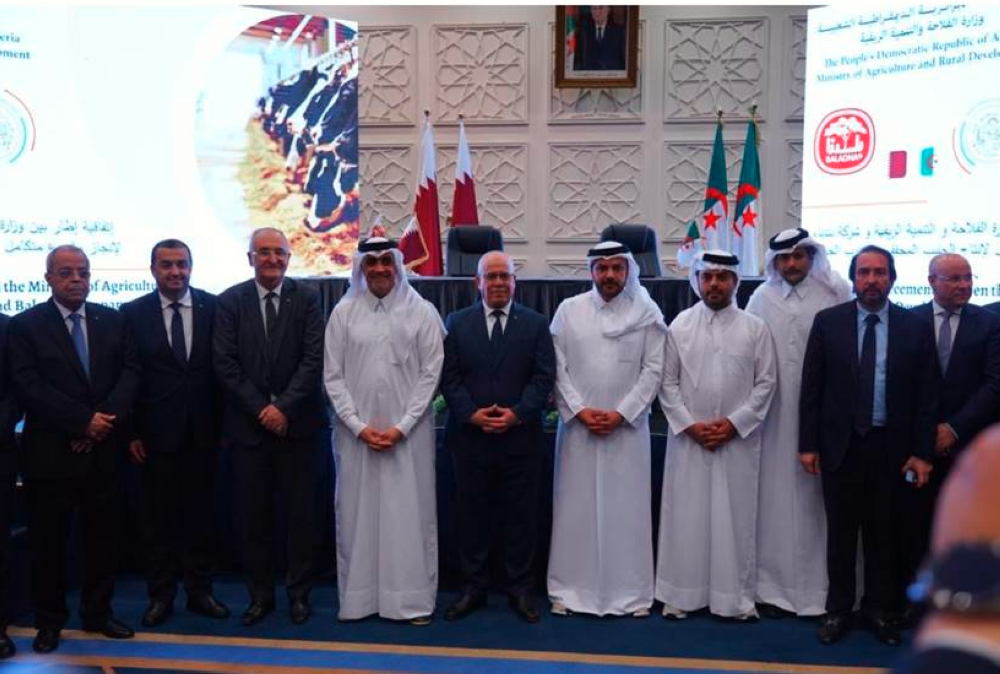Qatar’s Baladna Food Company has announced plans to build what it describes as the world’s largest integrated dairy complex in Algeria. This $3.5 billion venture could transform the North African country’s reliance on milk powder imports while sparking global debate on the sustainability of mega-farms in water-stressed regions.
The Project at a Glance
Baladna, which rose to prominence by scaling Qatar’s dairy self-sufficiency post-2017 blockade, will partner with the Algerian government through a 51:49 joint venture. A new entity, Baladna Algeria S.P.A., will oversee the project.
- Location: Adrar Province, deep in Algeria’s Sahara
- Size: 117,000 hectares of irrigated farmland
- Herd: 270,000 dairy cows
- Output: 100,000–200,000 tonnes of milk powder annually
- Jobs: Approx. 5,000 direct and indirect roles
- Timeline: Construction begins in 2026; first milk powder output by late 2027
- Technology Partner: German engineering giant GEA Group, responsible for milking, processing, and spray-drying infrastructure
The project is expected to cover up to half of Algeria’s current milk powder demand. In 2020, the country was Africa’s largest dairy importer, bringing in over 400,000 tonnes annually at a cost of nearly $800 million. Per capita consumption averages 114 litres per year — the highest on the continent — underscoring the political and social urgency of localising production.
Strategic Ambitions in Africa
For Baladna, Algeria is not an isolated bet. The company has already announced a $1.5 billion project in Egypt, Africa’s second-largest dairy importer, and a proposed dairy farm in Nigeria’s Ogun State. Together, these initiatives signal a bold push into Africa — the world’s third-largest dairy-importing region.
“The scale of Algeria’s initiative makes it both a food security project and a geo-economic play,” said one industry analyst. “Baladna is positioning itself not just as a Gulf champion, but as Africa’s leading dairy partner.”
Europe’s Stake in Algeria’s Dairy Imports
Algeria is not only a heavy consumer of dairy; it is also one of the largest importers of European milk powder, with France, the Netherlands, and Ireland among the dominant suppliers. Any large-scale substitution of imports with domestic production threatens to reshape EU–North Africa trade flows.
- For European exporters, Algeria has long been a dependable outlet for surplus SMP and WMP.
- A successful Baladna-Algeria venture could dampen EU export volumes and affect pricing strategies, especially as Europe grapples with oversupply and sustainability concerns.
- Conversely, suppose desert production proves costly or inefficient. In that case, EU exporters may retain their foothold — highlighting Algeria as a test case for whether import substitution in dairy can truly take hold in Africa.
Sidebar: Algeria and Europe’s Dairy Powder Trade
- A Top Buyer: Algeria consistently ranks among the top three non-EU destinations for European milk powder exports, alongside China and Nigeria. French cooperatives and Dutch traders, in particular, rely on Algerian demand to balance seasonal surpluses.
- Policy Linkages: The EU’s Common Agricultural Policy (CAP) encourages export of dairy surpluses, and Algeria’s subsidised import regime has historically complemented this, creating a stable trade corridor.
- Implications: If Algeria achieves even partial self-sufficiency through Baladna’s mega-project, it could undercut one of Europe’s most stable export markets. For the EU, this raises questions about how to manage internal surpluses — especially in a market already under scrutiny for climate impact and farmer protests over prices.
- Bigger Picture: For Africa, the shift signals a move towards localisation of dairy supply — though critics warn that desert mega-farms may swap dependency on European powder for dependency on Gulf-backed capital and technology.
Risks and Nuances
Behind the headline numbers lies a more complex picture:
- Water Stress: Adrar is a Saharan arid province. The project will depend heavily on deep aquifers, many of which are slow-recharging or non-renewable. Environmental groups like GRAIN warn that “mega-farms in deserts can create a mirage of food security while depleting fragile water systems.”
- Feed & Forage Costs: Producing feed crops in desert soils requires high inputs of irrigation, fertilisers, and energy. The long-term economic viability of sustaining 270,000 cows in this setting will hinge on logistics efficiency and subsidies.
- Social Impact: The 117,000-hectare land allocation raises questions about local land use, pastoral rights, and community water access.
- Governance & Overpromise Risk: Algeria’s dairy sector has long relied on subsidised imports. Whether this project can truly break that cycle without creating new dependencies remains uncertain.
A Turning Point for Algeria?
If successful, the project could cut Algeria’s milk powder imports by nearly half, create thousands of jobs, and build a local dairy ecosystem with advanced technology transfer. If not, it risks becoming a costly experiment in stretching desert resources.
Either way, the Baladna-Algeria project is set to become a case study in food security, trade realignment, and climate risk — with implications not just for Africa, but for Europe’s dairy industry as well.
